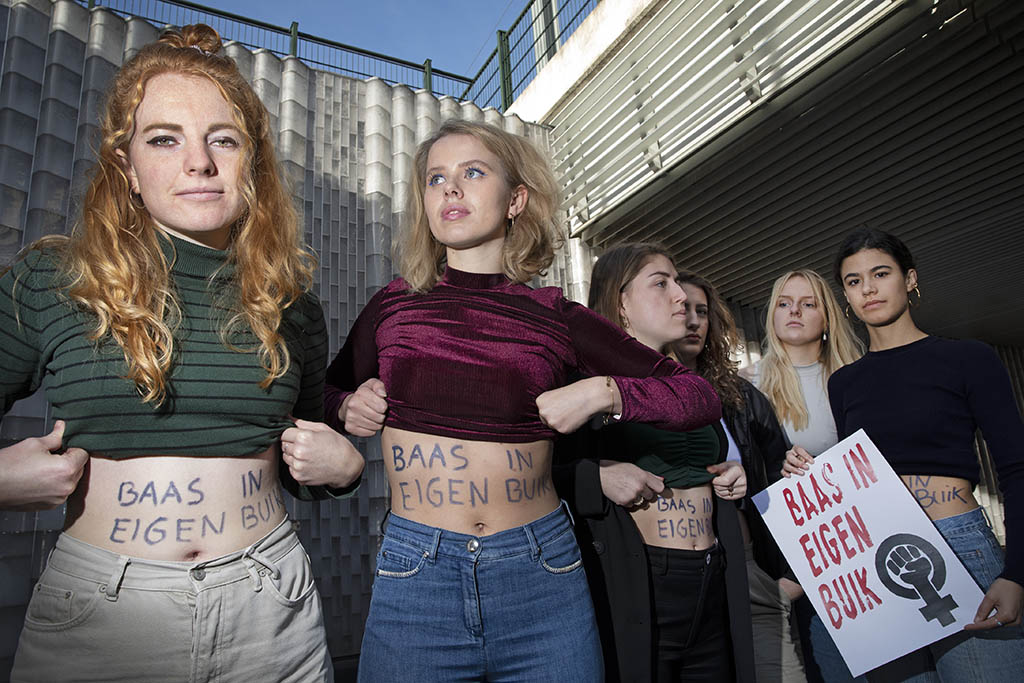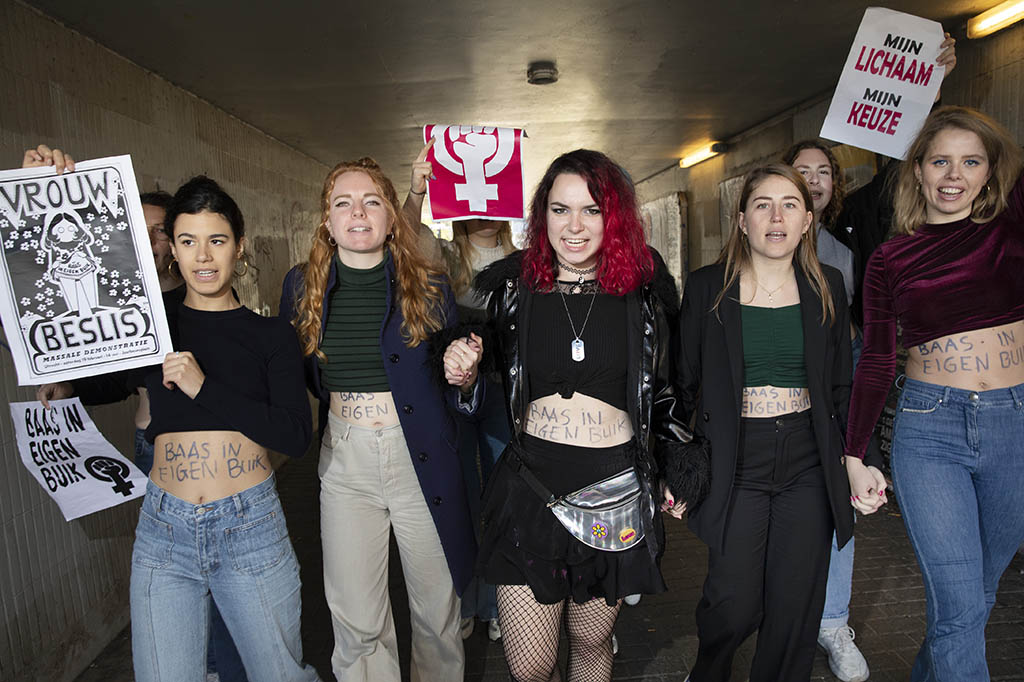‘Ban on abortion? Keep your paws off my freedom’
The right to abortion is the most normal thing in the world for Univers editor Anne Grefkens. Until she has to defend it during a night out: “Dear young man from the café. Are you reading this? Let me explain to you why the right to abortion is as important as ever.”

Everyone knows them: those places in town where you always have a good time. You like the smell, the buzz, or the atmosphere. Often you can’t even properly explain why that is. Café De Vos and de Craen is such a place for me. In my days as a student, philosophy students could order beers here at a twenty percent discount. The fact that some of us stood behind the bar on study-free days helped, of course. Even after my student days, I loved coming here. Where the café was initially the place to consume cheap beer, over the years, it became a breeding ground for interesting discussions.
Until a few weeks ago when I ran into a vague acquaintance in this cafe. Where our conversation began meek and friendly, it soon took a grim turn. At least, that was my experience. “Are you for or against abortion?” he asked me. Unprepared and completely naïve, I walked right into the rhetorical trap he set for me: “For abortion,” I replied firmly. “Why?” he asked.
The right to choose
To this seemingly simple question, I could not give an appropriate answer at that moment. Why am I actually pro-abortion? No idea. To me, things like organ donation, the right to euthanasia, and the possibility of terminating a pregnancy are as normal as the sun rising every morning. For lack of a better answer, I fell back on a slogan I had memorized from my history classes (over a decade ago): “Because a woman has the right to choose.” (baas in eigen buik: boss of your belly).
Then again, what it means exactly to have “the right to choose” and why it is such an important right, I could not put into words. After graduation, that essential piece of information from history class—along with the White Bike Plan and the housing shortage of the 1980s—promptly slipped my memory. That Balthasar Gerards was the murderer of William of Orange and Napoleon was defeated at Waterloo in 1815, however, I can recite without any difficulty. Funny really.
Because he had prepared for this conversation from an ideological and combative standpoint far better than I had, he fired a torrent of arguments at me. The reasons why, according to him, abortion laws should be ended? A selection: even at the moment of fertilization of the egg cell, a unique human life with its own DNA profile is created; the unborn child has the right to life; there are enough social safety nets to take care of the unwanted child; and—the argument that irritated me the most—you have to take responsibility for your sexual acts.

The conversation felt like a test I had not studied for. In a last desperate attempt not to lose face, I tried to appeal to his empathy: “What if there was rape or incest?” I was down: in inserting this argument, I was selling short all the women who had terminated pregnancies for other reasons. As if their motivations were any less legitimate. “That’s not the ‘fault’ of the unborn child,” he replied adamantly, to make matters worse. Whatever way the discussion twisted or turned; I came off badly. He was pro-life, and I was in favor of death, it seemed. Completely frustrated, I pulled a friend by her arm: “Shall we go? I want to go home,” I asked her pleadingly.
“A woman must take responsibility for her sexual acts. Then she shouldn’t have had unsafe sex”
Once home, things were spinning in my head. Surely I should have prepared better for such a conversation. Recently, the right to legal abortion was curtailed in the United States, and anti-abortion voices are becoming louder in many other Western countries as well. To think that the Netherlands would have a lucky escape is naive. Why were my arguments so ill-founded? Why did I feel like a failing feminist? After a night full of angry dreams, I promised to do better: from now on I will have my arguments ready.
Dear young man from the café, are you reading this?
You asked me why I am in favor of the right to abortion. I told you that a woman has the right to decide and by now I know very well what that means.
Self-determination
Of course I am not in favor of death, I thought later. Above all, I am in favor of self-determination (in Dutch): the right to a free choice in case of an unwanted pregnancy, including the right to abortion. Girls and women decide for themselves when there is an emergency, acting within the limits of the law. The law gives them access to safe and proper abortion care, and that right is a great thing. Moreover, it is a silly notion that girls and women will no longer terminate pregnancies when this right is taken away from them. For this, we need only look to the past.
In the Netherlands, abortion was banned in 1911. It became a punishable, expensive and, above all, dangerous procedure. The pregnant woman feared her life. The abortionist, gynecologist, or doctor feared the Penal Code. Indeed, that code shifted the crime from the pregnant woman to the abortionist. As a result, many doctors no longer dared to facilitate an abortion procedure. So, if there was no medical necessity, women had to find someone willing to perform an abortion in a back room.

Legal historian Madeleijn van den Nieuwenhuizen explains in her recently published book Leven en Laten Leven (in Dutch) (Live and Let Live) that—despite all these “legal” attempts—many women did not allow themselves to be stopped: “Many women therefore found themselves forced to puncture their cervix with knitting needles, squirt hot soapy water inside with a syringe, insert stones, throw themselves down stairs, et cetera, hoping that the physical shock would terminate the pregnancy.”
I wonder if the boy from the café knows this. Even if the vast majority of society says abortion is wrong and the Penal Code states that abortion is not allowed: history tells us that some women fear the physical consequences less than they fear the baby. They have the fetus removed anyway. Why? For them, a baby is—and here I quote the words of Van den Nieuwenhuizen: “Another baby, another mouth to feed. Or a baby already. Or a baby as a result of rape, of incest. A baby that endangers the health of the mother. Or just a baby you absolutely don’t want for whatever reason.”
Responsibility
Would the boy from the café think these women should be “protected” from themselves? I’m guessing so. “A woman should take responsibility for her sexual acts. Then she shouldn’t have had unsafe sex,” I can still hear him say. At the thought of that memory, chills run down my body. Not only was I explained in a rather patriarchal tone how the human body works. Without asking, I was also bombarded with Christian morality: she should do penance for her sins! “This idea of pregnancy as punishment for sins committed is heard more often in religious circles but also among people who were not raised in a religious manner, like me”, Van den Nieuwenhuizen writes.

“It’s completely in line with women’s sex education, which focuses more than men’s on responsibility, protection, and prevention. I wonder if men ever think about an STD that way. And also whether they sometimes experience an unintended pregnancy from their partner that way: as a physical punishment. I suspect not”.
Fortunately, current Dutch regulations are somewhat milder. In 1984, the Termination of Pregnancy Act came into effect. This states that a woman decides for herself whether to carry her pregnancy to term or not. In addition, the mandatory five-day abortion reflection period will expire on January 1, 2023. From then on, a woman may decide for herself how much time she needs to make this decision. Hooray!
The second sex
Are we in the Netherlands, then, coming ever closer to a society as envisioned by philosopher Simone De Beauvoir? In her major work, The Second Sex (in Dutch),she expresses her dissatisfaction with the systematic oppression of women. According to De Beauvoir, women are continually put in second place. She blames both men and women for this: men falsely state that society is equal, and women too easily go along with this. Her work is still appreciated worldwide for its originality and authenticity. Ruud Welten, associate professor at Tilburg University, also still studies her work regularly. In his book Wie is er bang voor Simone De Beauvoir (Who’s afraid of Simone De Beauvoir), he takes a close look at her most important work: “The Second Sex opposes a concrete-cast ‘essence of women’ that society imposes on women… De Beauvoir’s question is not ‘What is a woman’, but ‘How can I be free?’… Women are not ‘simply what they are because nature tells them to be'”.
“I am glad that emergency solutions such as knitting needles, hot soapy water, and falling down the stairs are a thing of the past in the Netherlands”
Welten’s succinct explanation of De Beauvoir feels like an answer to a question the boy from the café never asked me. A free interpretation of De Beauvoir’s work teaches me that an unwanted pregnancy due to (in)voluntary sex is not an insurmountable “fate.” A woman is free, and this freedom gives her the choice to accept or reject this “fate.” Only she decides whether to keep the fetus. But with this, Dutch society does not yet meet De Beauvoir’s demands: women—despite the Termination of Pregnancy Act—are still systematically oppressed.
Repentance
Indeed, allowing abortion to remain a taboo makes Dutch society far from neutral and equal. Besides the fact that people hardly ever talk about abortion, terminating a pregnancy is generally seen as a necessary “tough decision.” For many women, this is also the case. But this choice is by no means equally hard for everyone, Van den Nieuwenhuizen explains: “I felt discomfort because the impression was created that it cannot be possible for someone to consider an abortion a regular medical procedure. Sometimes we talk about abortion as if it is by definition something bad. Or worse, we don’t talk about it for that reason. The effect can be that we put pressure on people to experience their abortion as something traumatic.” As a result, women still have to show their repentance: if she herself does not already feel guilty about her abortion procedure, society will make sure she does.

So where the Dolle Minas (feminists) took to the streets to gain the right to abortion, there are plenty of reasons to take to the streets today as well: to offer a counter voice to the anti-abortion lobby, to defend the right to abortion AND to stop it from being taboo.
Cheers
Next time I go to the café, I will toast the Dolle Minas with their bare bellies from my history books. Thanks to them, women in the Netherlands do not have to interrupt their lives in case of an unwanted pregnancy. I am grateful that my friends, my nieces, my female colleagues, myself, and anyone else with a uterus—if we want to—can go to an abortion clinic. And that emergency solutions like knitting needles, hot soapy water, and a fall down the stairs are a thing of the past in the Netherlands.
I will also toast the boy who asked me “what I think about abortion.” Thanks to him, I know what it means to have the right to choose. “It makes me and all other women freer people. So keep your paws off my freedom. If I have to, I will pull up my shirt. Three guesses what is written on my belly,” I will answer him in the future. I raise my glass to the slogan “baas in eigen buik.” But not with beer, that is worthy of champagne!
| Univers is aware that this article is not only about women, but also about other people with uteruses. We do not want to exclude non-binary individuals and people who identify as male. |
Questions about abortion?
Do you have questions about abortion as a result of this article? Or would you like to share your story? If so, please visit www.avahelpt.nl (in Dutch). At Ava, you can find reliable information about abortion and contraception. This organization talks freely about freedom of choice and asks for more understanding for women who terminate a pregnancy. Would you like to support Ava? Then you can make a donation via: ww.avahelpt.nl/doneren/
Translated by Language Center, Riet Bettonviel






